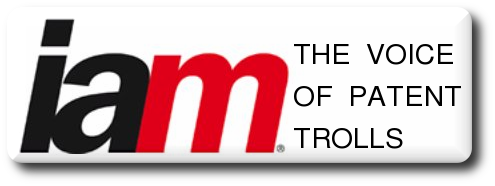

"The Federal Circuit and the Patent Trial and Appeal Board (PTAB) are particularly sceptical of low-quality patents."US courts have undone a lot of damage in that regard; they nowadays deny many plaintiffs the 'pleasure' of suing lots of defendants. The Federal Circuit and the Patent Trial and Appeal Board (PTAB) are particularly sceptical of low-quality patents.
"What good are a lot of patents if they don't actually represent novelty and something sufficiently advanced (a scientific advancement) to merit a patent?"It's not hard to imagine who would be hurt by this: the litigation 'industry'. IAM's 90th issue -- as laughable as it gets -- continues sobbing and moaning like it's all about numbers (patents and lawsuits), not actual value (or quantity over quality). They open up by taking stock of "entities with portfolios of 1,000 or more US patents" and it goes downhill from there. We'll get to that in a moment.
What good are a lot of patents if they don't actually represent novelty and something sufficiently advanced (a scientific advancement) to merit a patent? Do we want patent systems with over a million patent filings per day (like in China's SIPO)? Quite a few software patents are still being granted by the USPTO based on this morning's listing from New Hampshire, e.g. the one to Cisco:
Cisco Technology, San Jose, California, has been assigned a patent (No. 9,979,704, initially filed Dec. 17, 2014) developed by five co-inventors for “end-to-end security for virtual private service chains.”
One of the more substantive questions in the recent interpretation of what encompasses patentable subject matter under 35 U.S.C. ۤ 101 is whether facts should play any role in the analysis. The Supreme Court has not been perfectly clear on this issue, and the Federal Circuit appears to have taken both sides at various times. In last week's denial of en banc review for two cases, the Federal Circuit answered with an emphatic "yes." Thus, the question seems resolved. For now.
"Notice how close they're getting to the 10 millionth patent now. Worship the numbers?"Remember that in these circles, such as Watchtroll, one can only be "pro-patent" or "anti-patent" and when they meet someone who isn't as extreme as them (regarding patents) they just label that someone "anti-patent". Watchtroll already labels some judges and even Justices "anti-patent".
What good would Iancu's policies be if patents got granted only to be later rejected by courts? If anything, it would further reduce certainty/confidence in patents, exacerbating an already-serious problem. It's very costly, but the costs are associated with fees that lawyers pocket, so it's really a 'feature' to them.
"What good would Iancu's policies be if patents got granted only to be later rejected by courts?"IAM has also just published this article by Jason Lye, Sam Khoury and Corrine Sukiennik. It's basically another one of those rants about "quality, strength and predictability of the US patent system..."
Well, granting bad patents actually reduces "predictability". To make patent lawsuits more predictable the USPTO need to become a lot more strict about what patents it grants.
Under the laughable sound bite "Intangible investor", Bruce Berman writes that "America’s [US] confused response to increased global competition and IP uncertainty is threatening its innovation leadership..."
"They're either working for law firms or are funded by them (like IAM, which also gets funded by patent trolls)."He speaks of "IP uncertainty", but we suppose that by "IP" he meant patents and actually bemoaned how hard they are to enforce (it's hard to know what he meant because of IAM's paywall). Either way, the only solution to this is to become less lenient in examination (maybe investigate this 'revolving door' phenomenon).
Elsewhere in this issue there are some pure puff pieces (marketing) that say nothing at all and old news about standard-essential patents (SEPs). Zhang Hui and Richard Li wrote about Iwncomm v Sony and Richard Lloyd advocated this inescapable patent tax in the form of SEPs. Well, patent maximalists like Richard Li and Richard Lloyd (on both sides of the Pacific) don't really care about the impact of patents on pricing, competition, science etc. They're either working for law firms or are funded by them (like IAM, which also gets funded by patent trolls). ⬆